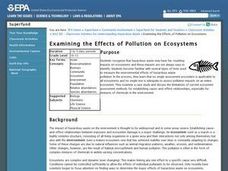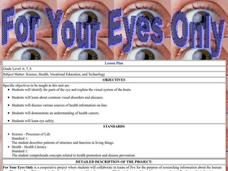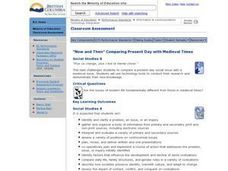Curated OER
Examining the Effects of Pollution on Ecosystems
Young scholars examine the different types of tests used to measure the environmental effects of hazardous waste. They work together to determine the impact of pollution on different ecosystems. They read a case study and answer...
Curated OER
Children of Yesteryear
Fifth graders go back through time to examine what would be different if they lived in the 1800s. They explore differences in clothing, leisure, communication, and access to art supplies.
Curated OER
KARYOTYPE ALTERNATIVES
Students comprehend that karyotyping is a process in which chromosomes are cut from an enlarged picture and arranged in decreasing order of size. The cells to be viewed are first chemically treated to increase the number of dividing...
Curated OER
Stravinsky and the Rite of Spring
In this music worksheet, students answer 20 questions about an extract from "Stravinsky and the Rite of Spring." Students also write an essay discussing a given quote about the extract.
Curated OER
Political Parties and Election Results, 1997 and 2000
Young scholars become familiar with the results of the Canadian Federal Election by analyzing data on the number of valid votes by political affiliation. In this civics lesson plan, students integrate data and knowledge with other...
Curated OER
Barnegat Bay Watershed
Students design a model watershed. In this watershed lesson, students learn the needed parts of a watershed and how they work. Students evaluate how watersheds effect communities.
Curated OER
Aquifers and Groundwater
Young scholars understand the purpose of an aquifer. In this aquifer and groundwater lesson plan, students build a model aquifer find its relationship to water usage. Young scholars record observations as they build the layers of the...
Curated OER
Food Webs in the Barnegat Bay
Students investigate the food webs in the Barnegat Bay. In this organisms activity, students use a graphic organizer to illustrate the types of consumers in the bay. Students use reference books to continue to research the animals found...
Curated OER
Get Ready, Get Set, Get Organized! Lesson 2 of 2
Seventh graders examine the importance of being organized when making transitions. In this organization lesson, 7th graders watch a teacher demonstration of entering a room in a disorganized manner before discussing how the transition...
Curated OER
The Declaration of Independence
Students reflect on the Declaration of Independence. In this U.S. History lesson, students read the Declaration of Independence then complete an activity and worksheet on the topic.
Curated OER
the Little Red Riding Hood
Students respond to the story of Little Red Riding Hood. For this Red Riding Hood lesson, students retell and discuss story elements. Students practice phonic sounds. Students role play, make predictions, use picture cards and practice...
Curated OER
For Your Eyes Only
Students complete several activities in a unit related to the eye. In this eye lesson, students work in groups to research information about the human eye and create a multimedia presentation. They research anatomy of the eye, how the...
Curated OER
Change in Early 20th Century America: Doing the Decades
Young scholars investigate and develop relationships between selected themes and resources. In this Us history lesson plan, students interpret, analyze, and evaluate shifts in continuity throughout US history. Young scholars will create ...
Curated OER
Deep Roots of Ancient Greece
Young scholars investigate Greek contributions to modern America. In this ancient Greek influence lesson, students watch videos, listen to lectures, and conduct research regarding ancient Greek ideals in order to analyze and trace Greek...
Curated OER
Walk on the Wild Side
Have your class practice alliteration using this activity. Learners listen to stories with alliterative elements and create their own sentences illustrating this technique. The activity is incomplete, but could be enhanced to provide a...
Curated OER
Canons Recognition
Students recognize canons by listening and by reading them in the context of a musical work. They notate canons and perform canons on their instrument. Afterward, they combine their simple canons with other students in order to create...
Curated OER
What Does Respect Look Like in School?
Fourth graders discuss why everyone needs and wants to feel respected. As a class, they share what respect looks like and what disrespect looks like. They pretend they have to leave their most valued object with a secret agent and what...
Curated OER
Complete or Incomplete? That is the Question!
Students work in small groups to determine factors that contribute to a well-done assignment. They report their findings to the rest of the class.
Curated OER
What To Do? What To Do? Part One
Third graders listen as the teacher exaggerates a way of inappropriately handling losing their job. They review life-changing events and what is in a person's control and what is not. They then are given a life-changing situation slip...
Curated OER
Time Is On My Side! Again!
Fourth graders evaluate their current test-taking and studying skills. In groups, they read a case study in which they create a time schedule for a week. They color code the scheduled and unscheduled activities for Frantic Fred and share...
Curated OER
Options and Extras!!! Learn All About It!
Eighth graders are asked what is the process of transitioning and why is it important? They listen as the counselor reviews the information from the pervious lesson. Students review peer sharing about what they have been taught and what...
Curated OER
Evaluating and Revising the Personal Plan of Study
Eleventh graders register for standardized tests and attend post-secondary information meetings that meet individual needs as well as work on updating and revising their personal plans for their futures. They brainstorm if any changes in...
Curated OER
Natural Figures
First graders look for geometrical shapes in nature to help them appreciate the diversity of the natural environment.
Curated OER
"Now and Then" Comparing Present Day with Medieval Times
Eighth graders compare a present-day social issue with a medieval issue. They use technology tools to conduct their research and demonstrate their new knowledge. Students present their findings to the class in the form of a PowerPoint.

























